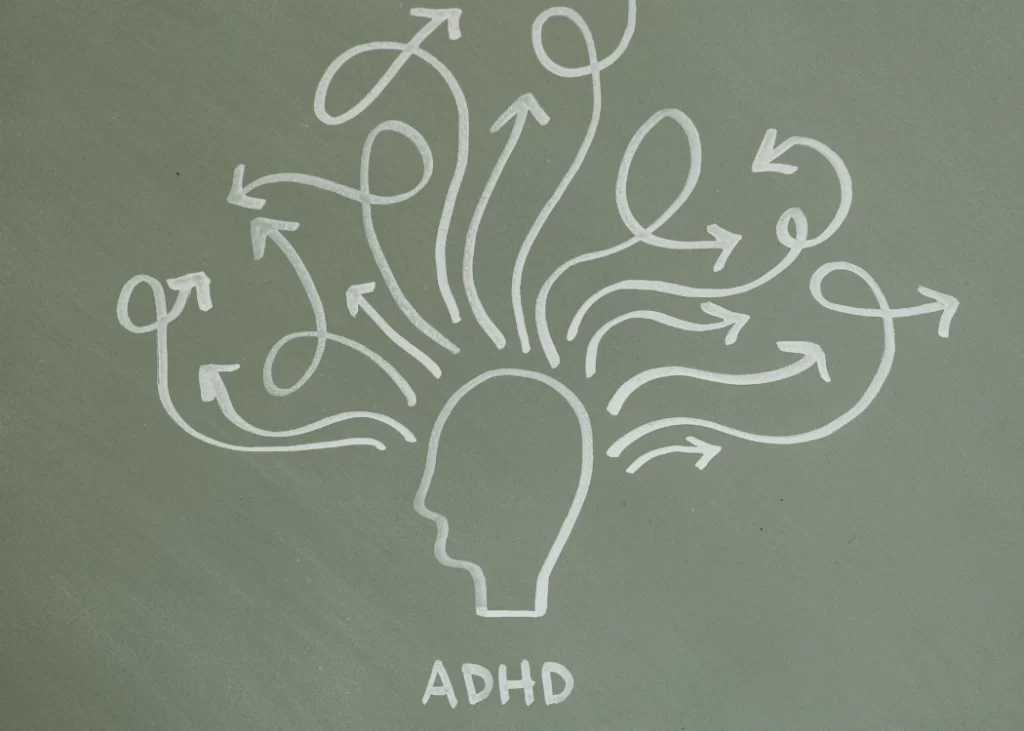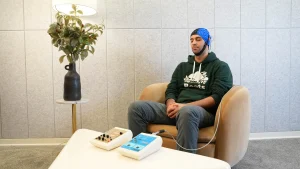Attention-Deficit/Hyperactivity Disorder (ADHD) affects millions of people worldwide, influencing various aspects of daily life—from work and school to personal relationships and self-care. Although ADHD is often thought of as a childhood condition, it persists into adulthood for many individuals. Understanding its impacts and learning practical strategies for managing its challenges can empower those with ADHD to live more balanced, productive, and fulfilling lives.
In this blog, we’ll explore what ADHD is, how it affects everyday activities, and dive into effective solutions and practical techniques to help individuals manage their symptoms and unlock their full potential.
Understanding ADHD
ADHD is a neurodevelopmental disorder characterized by difficulties with attention regulation, hyperactivity, and impulsivity. While the symptoms vary from person to person, common challenges include:
- Inattention: Difficulty sustaining focus, being easily distracted, or struggling with details.
- Hyperactivity: Excessive movement, fidgeting, or an inability to remain still.
- Impulsivity: Acting without thinking, interrupting others, or making hasty decisions.
A Closer Look at Diagnosis: The Role of QEEG Brain Mapping
One of the most accurate tools available for diagnosing ADHD is the Quantitative Electroencephalogram (QEEG) Brain Map. This non-invasive procedure measures electrical activity in the brain, identifying patterns that may indicate ADHD. The QEEG brain map provides objective data that can supplement clinical evaluations, offering a clear picture of how a person’s brain is functioning. This tool has proven especially valuable for distinguishing ADHD from other conditions and tailoring individualized treatment plans.

The Impact of ADHD on Daily Life
1. Work and Productivity – For many adults, the workplace presents a variety of challenges:
- Time Management: Difficulty estimating time, meeting deadlines, or organizing tasks can lead to missed deadlines and incomplete projects.
- Focus and Concentration: Distractions can disrupt workflow, making it harder to maintain productivity.
- Impulsivity: Hasty decision-making might result in mistakes or challenges in following through with complex projects.
2. Academic Challenges – Students with ADHD may experience:
- Learning Difficulties: Trouble focusing during lectures, completing assignments on time, or organizing study materials.
- Classroom Disruptions: Impulsive behaviors and restlessness can interrupt both personal learning and that of peers.
- Test Anxiety: Maintaining attention during exams can be challenging, leading to increased stress and lower performance.
3. Relationships and Social Interactions – ADHD can influence personal relationships in several ways:
- Communication: Impulsivity might lead to interrupting others or speaking out of turn, potentially straining conversations.
- Emotional Regulation: Rapid mood swings or frustration can cause conflicts with friends, family, or partners.
- Listening Skills: Difficulty staying focused during conversations might be misinterpreted as disinterest, affecting social connections.
4. Daily Routines and Self-Care – Even everyday tasks can become overwhelming:
- Organization: Keeping a tidy home, managing finances, or planning meals might feel daunting.
- Time Management: Forgetting appointments or misplacing items can create a sense of chaos.
- Self-Care: Prioritizing activities such as exercise, healthy eating, and relaxation may be challenging, further impacting overall well-being.

Practical Solutions and Techniques to Manage ADHD
While ADHD presents unique challenges, there are many effective strategies to manage its symptoms and improve quality of life. The key is to create a supportive environment, develop structured routines, and use techniques tailored to your specific needs.
1. Structured Routines and Organization
- Daily Schedules: Use calendars, planners, or smartphone apps to map out tasks and appointments. Visual schedules can help make abstract time more concrete.
- Task Lists: Break larger projects into smaller, manageable steps. Checklists can provide a sense of progress and achievement.
- Decluttering: Simplify your environment. Reducing visual and physical clutter helps minimize distractions and stress.
2. Time Management Strategies
- Timers and Alarms: Set specific times for tasks and use alarms as reminders to stay on track.
- Time Blocking: Allocate specific chunks of time for various activities (work, exercise, relaxation) and stick to these blocks.
- Prioritization: Identify the most important tasks for the day and tackle those first using tools like the Eisenhower Matrix to differentiate between urgent and important tasks.
3. Behavioral and Cognitive Techniques
- Cognitive Behavioral Therapy (CBT): CBT can help reframe negative thought patterns and develop coping strategies for managing distractions and impulsivity.
- Mindfulness and Meditation: Deep breathing exercises, mindfulness meditation, and yoga can improve focus and reduce impulsive behaviors by promoting a calm, centered mindset.
- Biofeedback and Neurofeedback:
- Neurofeedback is a cutting-edge technique that trains the brain to regulate its activity through real-time feedback from EEG sensors. Over time, this training can enhance focus, reduce impulsivity, and promote a calmer mental state.
- Biofeedback helps individuals gain control over physiological responses, such as heart rate and muscle tension, reducing overall stress.
Together, these techniques offer powerful, non-invasive methods to support self-regulation and improve cognitive function.
4. Medication and Professional Support
- Medication: Stimulants like methylphenidate and amphetamines are commonly prescribed to improve focus and attention. For those who experience side effects or have contraindications, non-stimulant options such as atomoxetine may be considered.
- Regular Consultation: Working closely with healthcare providers, therapists, or ADHD coaches can help tailor treatment plans to your unique needs and track progress over time.
5. Environmental Modifications
- Designated Workspaces: Create a specific area for work or study that minimizes distractions.
- Noise Management: Use noise-cancelling headphones or white noise machines to block out auditory distractions.
- Technology Aids: Utilize apps and tools (e.g., Pomodoro timers and digital planners) to help maintain focus during tasks.

6. Physical Activity and Nutrition
- Regular Exercise: Physical activity can boost dopamine levels and enhance concentration. Even short bursts of exercise throughout the day can be beneficial.
- Balanced Diet: Nutrient-rich foods, including omega-3 fatty acids, lean proteins, and whole grains, support brain function and energy stability.
- Adequate Sleep: Establish a consistent sleep routine and practice good sleep hygiene to support mood and cognitive function.
7. Social Support and Community
- Support Groups: Joining ADHD support groups, in-person or online, can provide insights and shared experiences.
- Family and Friends: Open communication with loved ones fosters understanding and creates a network of support.
- Professional Coaching: ADHD coaches specialize in helping individuals develop strategies for managing symptoms and achieving personal goals.
Embracing the Journey
Living with ADHD means navigating unique challenges every day, but it also offers opportunities to develop creative problem-solving skills, resilience, and adaptability. While it may require more effort to stay organized or focused, employing these practical techniques can lead to significant improvements in both personal and professional life.
Remember that managing ADHD is an ongoing process. It’s perfectly normal to have both good and challenging days. The key is to remain patient with yourself, celebrate every small victory, and continue exploring strategies that work best for you.
Conclusion
ADHD can impact daily life in numerous ways—from work productivity and academic performance to personal relationships and self-care routines. However, with the right strategies and tools, including advanced techniques like neurofeedback and accurate diagnostic tools like the QEEG Brain Map, you can manage symptoms effectively and lead a fulfilling, successful life.
By incorporating structured routines, effective time management, behavioral therapies, neurofeedback, and supportive lifestyle changes, you have the power to harness your unique strengths and overcome daily obstacles. With the right tools and support, ADHD doesn’t have to be a roadblock—it can be a pathway to creativity, innovation, and personal growth.
If you’re looking for additional resources or support, consider connecting with ADHD communities, professional coaches, or healthcare providers who specialize in ADHD management. Embrace your journey with ADHD, knowing that with the right strategies in place, you can unlock the full potential of your unique mind.
Elumind Centres for Brain Excellence is an integrated mental health center offering solutions that can help you with your mental/brain health needs. To start your journey, book your FREE 15-MINUTE PHONE CONSULTATION. We are here for you.








